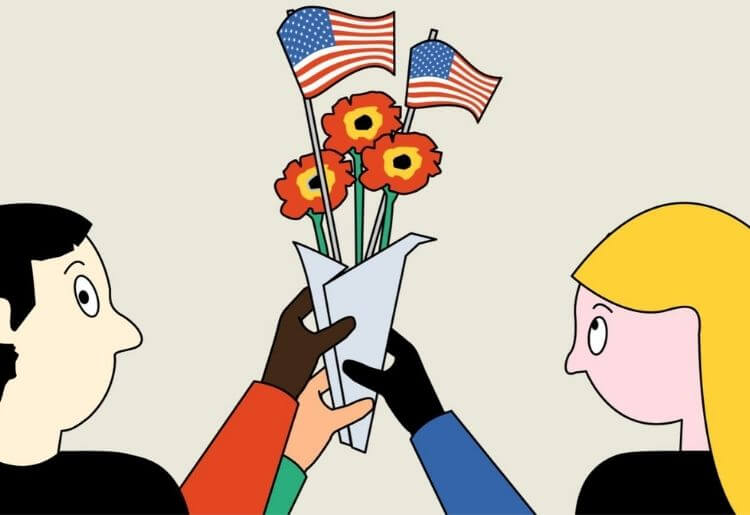If you find yourself swiping left on dating apps to everyone except those who have specific traits, you may be guilty of groundhogging. The term is taken from the movie Groundhog Day, where the protagonist wakes up every day and realizes that it's February 2nd—the same day as before.
In the dating world, groundhogging refers to the pattern of finding partners who are similar in many ways but expecting each new relationship to have a better outcome.
Here are common signs you could be groundhogging with some tips to assess these situations and start behaving differently.
» Ready to meet your true other half? Try Zoosk.
1. The People You Date All Look the Same
Many of us have a specific type of partner we are looking for, but in reality, chemistry rarely adheres to a type! There's no need to date people you aren't attracted to, but if you get to know someone outside your usual type before making a snap judgment, you might be surprised at who you are attracted to.
2. You Have Highly Specific Dealbreakers
It's fine to have dealbreakers, such as not wanting to date someone who is rude to other people or whose relationship goals are incompatible with yours. But if your dealbreakers are specific things like what kind of music someone listens to or what profession they're in, broadening the scope of what you're looking for could help bring more great people into your life.
» Want to date people outside your usual type? You should try open-minded dating.
3. Your Relationships Tend to End for Similar Reasons
The same way we date people with similar traits, we also tend to date people with similar problems. Consequently, relationships end for similar reasons.
For example, if you like people who have a lot of money, but they don't have time for you because their work is their top priority, changing this standard could allow you to meet people who have more time to devote to the relationship.
4. Your Partners All Come From the Same Background as You
A lot of us feel most comfortable with people who grew up in the same place as us, share our religion or ethnic background, or were raised with similar values.
But dating people from totally different backgrounds can open our eyes to new perspectives and teach us much more about the world. Explore black dating sites, get coffee with someone younger than you, or chat with someone who speaks English as a second language.
If nothing else, that date alone will probably help widen your comfort zone.
» Not finding what you're looking for in a partner? You should try the best dating sites for specific interests.
5. You Play Out Patterns in Your Relationships That Existed With Your Parents
People sometimes repeatedly end up in the same position because they choose partners similar to their parents and replay situations from their childhood.
Perhaps, for instance, you had a mother or father who was overly affectionate. In your adult years, you're now drawn to partners who shower you with attention—but you also end up being needy.
Talking to a therapist can help you identify these patterns and prevent your past from shaping your future.
6. You and Your Partners Tend to Have the Same Interests
Another axis along which people tend to connect is through hobbies and interests. Maybe you want a partner who can play tennis with you or talk to you about computer software.
Once you're in a relationship, though, too many shared interests can be a stumbling block. It's essential to each have your own lives and separate identities.
Sharing values is more important than sharing passions, and you can always teach each other about your interests.
» Met someone new? Here are the most important questions to ask when dating.
7. You Rush Into Relationships
Jumping into relationships head first doesn't give you time to assess whether the other person is truly right for you or if they simply feel comfortable and familiar.
If groundhogging is a pattern for you, try taking your time to get to know people. Think hard about whether they're right for you or if they just match your usual type.
One rule of thumb is to date for at least a few months before closing off your other options or committing to a serious relationship.
8. You Find Comfort in the Familiar
If you like routines and familiarity puts you at ease, you may be extra susceptible to groundhogging. If you're always ordering the same meals at restaurants, be mindful of your dating choices and make sure you're not doing the same thing with partners.
You might want to download a dating app, such as Zoosk or OurTime, to expose yourself to a new pool of options. Even when you're in a relationship, you should move out of your comfort zone. There are exciting relationship apps for couples to keep things fresh and re-energized.
» Want to date younger people? Learn more about the Gen Z dating culture.
9. You Try to Recreate Situations From Past Relationships
Some people want to recreate relationships they've had with exes because they're not entirely over that person or think that if they can find someone similar, they'll be as happy as they were.
Mourning for an ended relationship is essential. It will help in choosing a new partner and healthily starting a new relationship. When someone doesn’t take the time to grieve, they are more likely to make the same choices, meaning a higher likelihood of another failure.
People often have relationship patterns. Taking time before beginning a new relationship allows us to examine these patterns and break the negative ones. This is the best way to make sure that dating after your breakup will bring you more of what you desire.
Unfortunately, no relationship can be replicated. If you're trying to reproduce a previous partnership, there is a strong possibility that you want to get back together with that person. If not, appreciate that others can bring different—but equally valuable—things to the table.
10. You Underestimate Your Own Value
Research in relationship psychology has shown that your self-esteem directly impacts the quality of your relationships. Interestingly, we sometimes date people we aren't strongly attracted to or interested in because we don't know our own worth and don't think we can find someone better.
This is why we encourage you to aim higher! Take that risk and ask out somebody who seems out of your league, and you may learn that you are more desirable than you realized.
One way to improve how you feel about yourself is to spend more time alone, focused on enjoying yourself, aka solo dating. So, plan activities that you want to explore as if you were going on a date with someone else, but do it on your own.
Dating yourself like this is a great way to increase your self-esteem and to make sure that you love yourself first.
Break the Cycle
Don't get us wrong; it's a good thing to have standards and not settle for someone you aren't totally into. In fact, we encourage using background check dating apps to screen strangers before meeting them.
However, when we're too close-minded about who we date, we miss out on opportunities. It's time to break the cycle of groundhogging and failed relationships. Even if it's just an experiment, try dating people outside your usual type. You might be pleasantly surprised by who you find.
» Want to date mature people? Try these Plenty of Fish alternatives.


